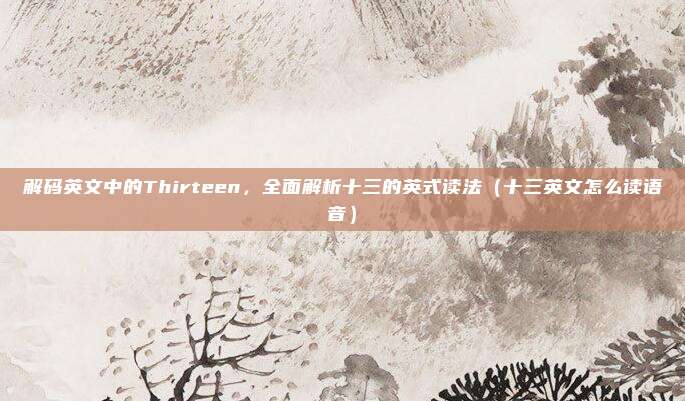解码英文中的Thirteen,全面解析十三的英式读法(十三英文怎么读语音)
温馨提示:这篇文章已超过224天没有更新,请注意相关的内容是否还可用!
In the intricate tapestry of the English language, numbers play a unique role, each bringing its own charm and peculiarities. One such number is "thirteen," which, despite its simple numerical value, carries with it a set of nuances and peculiarities. This article delves into how "thirteen" is pronounced in English and explores related terms that are often associated with it.
Understanding the Pronunciation of "Thirteen"
When it comes to the pronunciation of "thirteen" in English, there are two primary ways to articulate the number. The first, and perhaps the most common, is the straightforward approach. The word is pronounced as "thirteen," with the "th" sound being a distinct throaty whisper, followed by the "ee" as in "see," and finally, the "en" as in "den."
For instance, if you were to ask someone "How old are you?" and they replied "Thirteen," you would hear the number pronounced exactly as it's spelled.

The Alternative Pronunciation: "13"
However, there's another, more casual way of pronouncing "thirteen," especially in informal or colloquial contexts. This is where the number is simply stated as "thirteen" without the "th" sound. It's pronounced as "13," with a quick and concise enunciation that often passes over the "th" part of the word.
For example, if a friend were to say, "Let's meet at 13 for coffee," they would likely omit the "th" sound, making it sound like "uh teen."
Related Terms and Phrases
"Thirteen" is not just a standalone number; it's also closely associated with various terms and phrases. One of the most famous is "the 13th," which refers to the ordinal form of the number. It's commonly used in contexts such as birthdays, anniversaries, or the 13th day of the month.
Another term often associated with "thirteen" is "13," which, as mentioned earlier, is a more casual and abbreviated way of referring to the number. This abbreviation is widely used in various contexts, from sports (like basketball's "13" jersey) to popular culture (such as the movie "Thirteen").
Historical and Cultural Perspectives
The number "thirteen" has been shrouded in superstition and myth across different cultures. In Western superstition, for example, 13 is considered unlucky, with a common belief that 13 people dining together is a recipe for bad luck. This superstition is so deeply ingrained that it has influenced various aspects of culture, from architecture (no elevators with the 13th floor) to dining etiquette (some hotels and restaurants avoid having 13 guests).
In contrast, other cultures view 13 differently. In some Eastern cultures, 13 is considered a lucky number, and it's often associated with prosperity and good fortune.
Conclusion
The number "thirteen" might seem straightforward, but its pronunciation and related terms showcase the richness and diversity of the English language. Whether you're engaging in a formal conversation or enjoying a casual chat, understanding the nuances of "thirteen" and its related phrases can enhance your communication skills and cultural awareness. So next time someone asks you about your age, or you're setting a meeting, remember that "thirteen" can be pronounced in more ways than one.
网站文章、图片来源于网络,以不营利的目的分享经验知识,版权归原作者所有。如有侵权请联系删除!





还没有评论,来说两句吧...